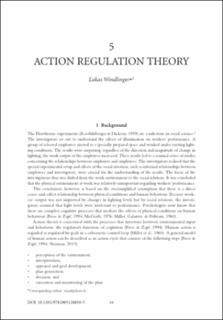Bitte benutzen Sie diese Kennung, um auf die Ressource zu verweisen:
https://doi.org/10.21256/zhaw-22745| Publikationstyp: | Buchbeitrag |
| Art der Begutachtung: | Editorial review |
| Titel: | Action regulation theory |
| Autor/-in: | Windlinger Inversini, Lukas |
| et. al: | No |
| DOI: | 10.1201/9781003128830-5 10.21256/zhaw-22745 |
| Erschienen in: | A Handbook of Theories on Designing Alignment between People and the Office Environment |
| Herausgeber/-in des übergeordneten Werkes: | Appel-Meulenbroek, Rianne Danivska, Vitalija |
| Seite(n): | 54 |
| Seiten bis: | 67 |
| Erscheinungsdatum: | 2021 |
| Verlag / Hrsg. Institution: | Routledge |
| Verlag / Hrsg. Institution: | Oxon |
| ISBN: | 9781003128830 |
| Sprache: | Englisch |
| Schlagwörter: | Action regulation; Regulation problems; Environmental stressors; Environmental comfort |
| Fachgebiet (DDC): | 158: Angewandte Psychologie 331: Arbeitsökonomie |
| Zusammenfassung: | Action regulation theory addresses the cognitive regulation of actions. Action regulation is taking place on three levels: automated regulation, flexible action patterns, and intellectual regulation. These regulation levels are activated on an as-needed basis in order to sequentially perform actions contributing to achievement of goals and sub goals. Action regulation is described in terms of regulation requirements (complexity) and regulation possibilities (control). Applied to the work environment it provides a psychological account of regulation problems or environmental stressors in three broad categories. Regulation obstacles refer to regulation difficulties caused by unfavourable environmental conditions and interruptions by people. Overtaxing regulations refers to overload caused by overstimulation by task inherent factors, physical environment, or social environment. Regulation uncertainty refers to qualitative overload. Action regulation theory generally contributes to the understanding of job demands, resources, and stressors at work and its application in workplace research allows to identify and understand environmental influences, as part of work conditions, on employees. |
| URI: | https://digitalcollection.zhaw.ch/handle/11475/22745 |
| Volltext Version: | Publizierte Version |
| Lizenz (gemäss Verlagsvertrag): | CC BY-NC-ND 4.0: Namensnennung - Nicht kommerziell - Keine Bearbeitungen 4.0 International |
| Departement: | Life Sciences und Facility Management |
| Organisationseinheit: | Institut für Facility Management (IFM) |
| Enthalten in den Sammlungen: | Publikationen Life Sciences und Facility Management |
Dateien zu dieser Ressource:
| Datei | Beschreibung | Größe | Format | |
|---|---|---|---|---|
| 2021_Windlinger_Action-regulation-theory.pdf | 355.22 kB | Adobe PDF |  Öffnen/Anzeigen |
Zur Langanzeige
Windlinger Inversini, L. (2021). Action regulation theory. In R. Appel-Meulenbroek & V. Danivska (Eds.), A Handbook of Theories on Designing Alignment between People and the Office Environment (pp. 54–67). Routledge. https://doi.org/10.1201/9781003128830-5
Windlinger Inversini, L. (2021) ‘Action regulation theory’, in R. Appel-Meulenbroek and V. Danivska (eds) A Handbook of Theories on Designing Alignment between People and the Office Environment. Oxon: Routledge, pp. 54–67. Available at: https://doi.org/10.1201/9781003128830-5.
L. Windlinger Inversini, “Action regulation theory,” in A Handbook of Theories on Designing Alignment between People and the Office Environment, R. Appel-Meulenbroek and V. Danivska, Eds. Oxon: Routledge, 2021, pp. 54–67. doi: 10.1201/9781003128830-5.
WINDLINGER INVERSINI, Lukas, 2021. Action regulation theory. In: Rianne APPEL-MEULENBROEK und Vitalija DANIVSKA (Hrsg.), A Handbook of Theories on Designing Alignment between People and the Office Environment. Oxon: Routledge. S. 54–67. ISBN 9781003128830
Windlinger Inversini, Lukas. 2021. “Action Regulation Theory.” In A Handbook of Theories on Designing Alignment between People and the Office Environment, edited by Rianne Appel-Meulenbroek and Vitalija Danivska, 54–67. Oxon: Routledge. https://doi.org/10.1201/9781003128830-5.
Windlinger Inversini, Lukas. “Action Regulation Theory.” A Handbook of Theories on Designing Alignment between People and the Office Environment, edited by Rianne Appel-Meulenbroek and Vitalija Danivska, Routledge, 2021, pp. 54–67, https://doi.org/10.1201/9781003128830-5.
Alle Ressourcen in diesem Repository sind urheberrechtlich geschützt, soweit nicht anderweitig angezeigt.